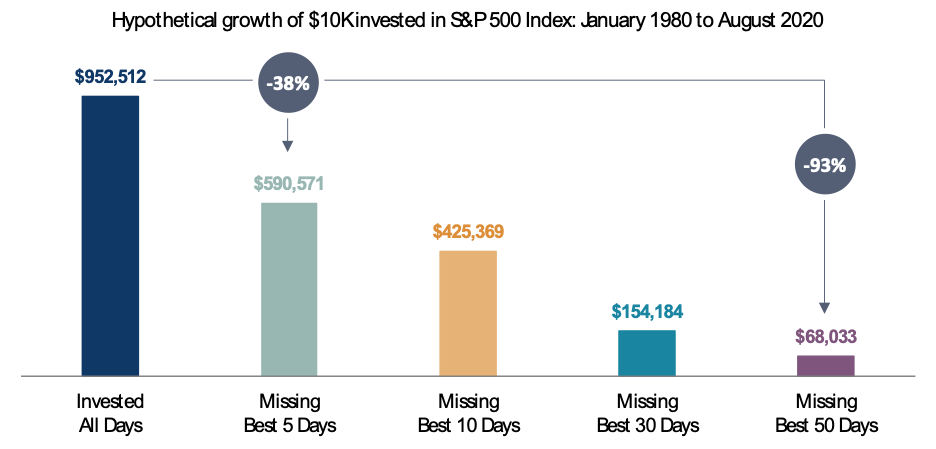
Tune Out the Noise: How Emotions Interfere with Investing for the Long Term
- October 23, 2020
Share this article
It’s happened to all of us – we experience something that causes our heart to thunder in our chest, our adrenaline to spike, and our “flight or fight” instincts to kick in. Sometimes we even seek out this thrill. After all, who hasn’t enjoyed a haunted house during the Halloween season or a roller coaster when they were young? In these situations, our human instincts are certainly not a “problem,” but in the world of investing, these same instincts often urge us to “do something” and can wreak havoc on our financial decisions.
When it comes to our financial portfolios, even when it doesn’t feel that way, sitting tight and remembering that “doing nothing” is “doing something” is often the best choice we can make. After all, missing just the 5 best days in the last 40 years would have reduced a large-cap equity investor’s return by 38%!
Missing Out on the Best Days Can Be Costly
 Source: FMRCo. Data as of 8/31/2020. https://www.fidelity.com/viewpoints/investing-ideas/six-tips
Source: FMRCo. Data as of 8/31/2020. https://www.fidelity.com/viewpoints/investing-ideas/six-tips
Human instincts evolved to give us the best chance for success in a wildly uncertain world. Our instincts developed to solve a different set of problems than those presented by modern financial markets. Our hunter-gatherer forebearers often had to make split second life-or-death decisions based on pattern recognition and adrenaline-driven reflexes – instincts that helped them survive but are less applicable to our financial portfolios. Today’s financial markets have different “threats” and our instincts lead us to make emotionally driven decisions that are typically not part of a sound investment strategy. Newspaper headlines, overheard conversations, political theatre, and social media memes can stir up our emotions and prod us into making quick decisions. These quick decisions rarely align with our long-term investment strategy and, while they may work in the short run, it’s rare that these changes will lead to long term investment success.
Being aware of our emotions and how they are impacting us is different from ignoring them. Understanding our psychology and how our emotions impact our biases can be helpful, both in “keeping us in our seats” and in thinking through the logic that will help us make good decisions. Three biases that frequently impact our financial decision making are: herd mentality, recency bias, and confirmation bias.
Herd Mentality
Just like it sounds, herd mentality is the idea of going with the crowd, or “the herd.” We tend to believe in “safety in numbers” and when we perceive that “everyone” is doing something, we feel that should be doing it too. In the financial markets, an investor exhibiting “herd instinct” will gravitate toward investments similar to those they think everyone else is buying. This can be both on the “buy” side, where FOMO (fear of missing out) might drive an investor to buy an investment that’s a “sure win,” or on the sell side, when markets are trending down and the fear is that everything is going to zero.
Volatility can cause our adrenaline to spike and urge us to take quick action. Together with everyone else, this herd instinct has a history of starting large, unfounded market rallies or sell-offs and proves the old stock market maxim of “when everybody knows, it’s already too late.”
Recency Bias
Recency bias is our preference to ignore “old” information in favor of more recent data. It also means we’re likely to weigh recent experiences more heavily than those that happened in the distant past. For example, can you remember what you ate for dinner yesterday? How about what you ate last Wednesday? What about on August 15, 2019? While you’re likely to remember what you ate yesterday and maybe even last week, it’s unlikely (unless it was a very special meal) that you remember what you ate over a year ago. The meal you ate yesterday, however, is likely to impact your decision on what to eat today. Whatever you had last week or last year is much less likely to be impactful. The same idea holds true when we think about the financial markets.
While studies consistently show that stocks deliver better returns than bonds, “recent” experience of a downturn in equities may seem more impactful than “old” studies and cause investors to sell-off stocks and buy bonds. When the market turns and equities start going up, those same investors often chase the recent uptick and try to rotate back into equities. The transaction costs and missing out on periods of rising markets prices can severely impact long-term returns.
Confirmation Bias
We all like being right. To that end, we tend to put greater trust in information that confirms what we already believe. We simultaneously ignore information – even if accurate – that runs counter to our beliefs. With the amount of research available to us at our fingertips, a little bit of searching can often uncover statistics and seemingly believable information that affirms what we already thought. When it comes to the financial markets, where most data is up for interpretation, confirmation bias greatly impacts how we gather, interpret, and recall information. The best antidote is to be aware of our biases and to seek out evidence-based, peer-reviewed research.
Our emotions are what make us human and it would be impossible to ignore them completely – nor would we want to! However, when it comes to our financial portfolios, emotional reactions are rarely a good idea. A financial professional can help “tune out the noise” of clickbait headlines and market pundits on networks eager to sell advertising. Logic and proven research, not emotion and adrenaline-driven reactions, are the most reliable guides to long-term success in investing. If you would like some help with taking the anxiety and uncertainty out of your financial plan and investments, we would love to talk with you.
Subscribe To Our Newsletter
Garrison Point Advisors, LLC doing business as “Treehouse Wealth Advisors” (“TWA”) is an investment advisor in Walnut Creek, CA registered with the Securities and Exchange Commission (“SEC”). Registration of an investment advisor does not imply any specific level of skill or training and does not constitute an endorsement of the firm by the Commission. TWA only transacts business in states in which it is properly registered or is excluded or exempted from registration. A copy of TWA’s current written disclosure brochures, Form ADV Part 1 and Part 2A, filed with the SEC which discusses among other things, TWA’s business practices, services, and fees, is available through the SEC’s website at: www.adviserinfo.sec.gov.
Certain hyperlinks or referenced websites, if any, are for your convenience and forward you to third parties’ websites, which generally are recognized by their top-level domain name. Any descriptions of, references to, or links to other products, publications or services does not constitute an endorsement, authorization, sponsorship by or affiliation with TWA with respect to any linked site or its sponsor, unless expressly stated by TWA. Any such information, products or sites have not necessarily been reviewed by TWA and are provided or maintained by third parties over whom TWA exercises no control. TWA expressly disclaims any responsibility for the content, the accuracy of the information, and/or quality of products or services provided by or advertised on these third-party sites.

